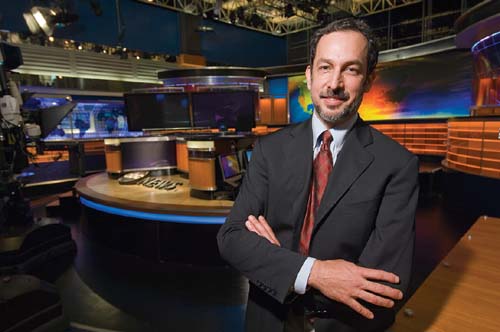 |
 |
| current issue |  |
past issues |  |
send a letter/news |  |
address update |  |
advertise |  |
about us |  |
alumni home |
Features
|
The Opinionator
ABC's Gary Langer '80 wants to know what you think. He's polling thousands of other people to find out. Got a problem with that? by Jane Harrigan Photography by Perry Smith |
Easy to print version |
If numbers were shouts, Gary Langer's office at ABC News would sound like Yankee Stadium.
Numbers call to him from printouts piled high on the glass-topped coffee table. Stacks of stats in tiny type spill across his desk, bumping the bottoms of two large computer monitors. Over by the window, stray survey pages have drifted to the floor. He'll pick them up someday, but right now, more numbers are calling. They beep into his e-mail inbox; they buzz into his BlackBerry. Questions about numbers keep his phone ringing and his assistants striding in and out with new piles of data.
"Make sense of me!" the numbers beg. "Put me in context. Help me tell a story." And all day, as polling director for the network, Langer does the numbers' bidding. All day, and sometimes into the night, the data cop works the beat. If ABC is going to use a number, it had better be a reliable number, one that Langer has stamped with his ultimate term of approval: airworthy. If the sample or the questions or the analysis doesn't meet the standards of Langer and his staff, ABC News will not use the poll--even if it's cool and sexy and every other news organization is putting it in headlines.
 |
Call him the data wrangler, the number whisperer. Call him the network's top cop, as Freakonomics author Steven Dubner does in his New York Times blog. Call him rigorous, as "World News Tonight" anchor Charles Gibson does in his office, or meticulous, as senior national correspondent Jake Tapper does on the air. Call him the Poobah of Polling, Langer's joking nickname for himself on his ABC blog "The Numbers." But above all, call him a journalist. "I am not a pollster," Langer says early and often. "I am a journalist who does polls. I cover a beat, the beat of public opinion."
His 22 years on that beat have created demand for his speeches and analyses everywhere from The Washington Post and National Public Radio to The Journal of Pain. Under Langer, the polling unit won its second Emmy award this fall (the only two Emmys ever to cite public opinion polls) and has earned three more Emmy nominations. Both awards were for ABC's work on "Iraq: Where Things Stand." The giant megaphone of ABC News shouts his unit's research to the world. That research includes the expected, like election polls and consumer confidence surveys, and plenty of the unexpected: polls of civilians in Iraq and Afghanistan, polls on manners and motherhood and Americans' satisfaction with their sex lives. For each poll, the unit releases not just a summary and analysis but the full questionnaire and results, all stored in the online "poll vault." (http://abcnews.go.com/pollingunit/) "Here's the data," Langer is saying. "Take our word for it, or drill as deep as you want."
Conducting polls is Langer's job; educating people about polling is his mission. For the ABC News web site, he's written a guide to polls for the uninitiated. If people are wondering, for instance, why ABC News pollsters now make calls to business phones, he wants to be sure they have a place to look for answers. Langer has spent years agitating for other news organizations to establish a vetting process like the one his unit employs. He counts it as progress that similar operations are now taking hold at the Associated Press, the Times and the Post (where the polling director is Langer's former assistant).
Page: 1 2 3 4 Next > blog comments powered by Disqus
